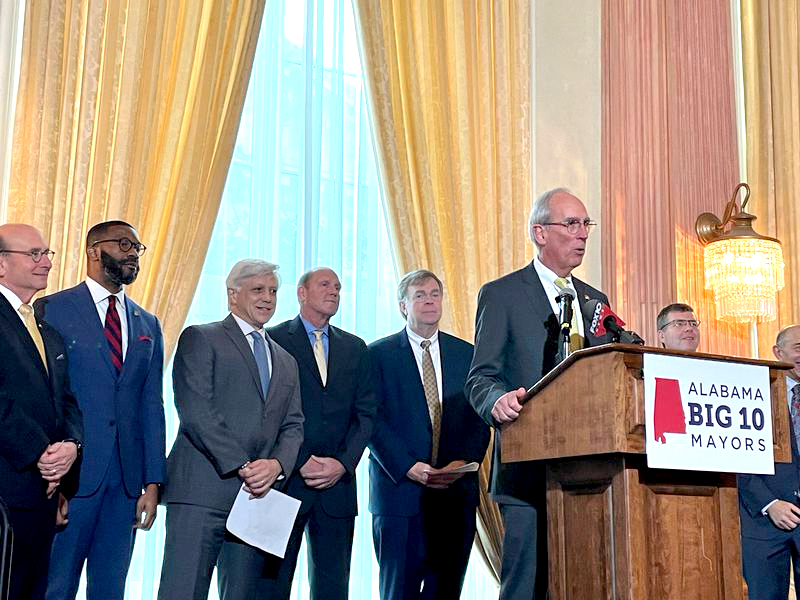By John Sharp
The mayors of Alabama’s 10 largest cities are calling for a ban on “exhibition driving,” a policy priority for Birmingham city officials amid reports of revved up engines and tire screeching.
Such a ban, if passed by the state legislature, would add criminal penalties against drivers who purposefully create unnecessary engine noise, tire skid and burnouts, or use other dangerous and damaging driving techniques.
The ban was included in a list of legislative agenda policy priorities for the mayors of Alabama’s largest cities. The group, called the “Big 10 Mayors,” include Birmingham Mayor Randall Woodfin, Huntsville Mayor Tommy Battle, Mobile Mayor Sandy Stimpson, Montgomery Mayor Steven Reed, Tuscaloosa Mayor Walt Maddox, Madison Mayor Paul Finely, Hoover Mayor Frank Brocato, Auburn Mayor Ron Anders, Decatur Mayor Tab Bowling, and Dothan Mayor Mark Saliba.
The mayors formulated their priorities during a late January retreat in Mobile.
“Policy decisions made in Montgomery have a direct impact on our cities,” a statement from the organization reads. “And with nearly three out of four Alabamians living either in or around our state’s 10 biggest cities, legislation that creates jobs and improves public safety in our communities benefits the vast majority of Alabamians.”
The ban on exhibition driving would address a series of horrific incidences that occurred last year in the Birmingham area.
- At least nine people were critically injured in Birmingham in December after crash occurred at John Rogers Drive and Gun Club Road after witnesses said a Dodge Charger and Nissan 370z were doing donuts when the two vehicles collided, and at least one of them veered into a crowd of bystanders.
- In August, a woman was killed and four others were injured after a vehicle doing a burnout struck another vehicle in a parking lot in the 800 block of Second Avenue North. Gunfire also erupted after the two vehicles collided.
- In July, a 14-year-old boy was killed when he was struck watching exhibition driving in Birmingham.
For Woodfin, the ban is a priority, and he touched on the issue during his annual State of the City address in January. He is calling on lawmakers to take swift action and address the matter when they gather for their spring legislative session next week.
Rep. Juandalyn Givan, D-Birmingham, said earlier this year that she wanted to bring forward a bipartisan bill during the spring session. No bill has been introduced yet.
Other priorities listed by the mayors of the state’s 10 largest cities, according to a news release issued Friday:
- Implement penalties and call for swifter prosecutions against people found in possession of a “trigger activator” device, such as a “Glock switch.”
The devices are federally illegal and not authorized by gun manufacturers. They effectively turn a semi-automatic firearm into a fully automatic weapon by increasing the number of rounds fired per second. They also decrease the control a shooter has over the firearm, increasing risks to bystanders and law enforcement.
New state legislation would allow state and local law enforcement to address the issue without waiting on the federal government’s sometimes lengthy indictment process.
The state legislation is favored by Mobile city officials, where a chaotic shooting on New Year’s Eve was caused by a gunman who transformed a semi-automatic pistol into an automatic weapon via a Glock switch. Ten people were injured, and one killed during a shooting that occurred blocks away from the city’s MoonPie Over Mobile festival.
- Renew and expand the Alabama Jobs Act and the Growing Alabama Act, both slated to expire on July 31.
The incentive programs, according to the mayors, are critical in keeping Alabama’s economy globally competitive to attract new businesses and new jobs.
A joint legislative study commission on economic development incentives, in December, recommended a five-year extension of the Jobs Act. The group also recommended the Legislature increase the $350 million cap on economic development incentives.
Alabama Commerce Secretary Greg Canfield said the programs are responsible for attracting $22 million in new investment in Alabama, and the creation of 38,500 new jobs since 2015, when the Jobs Act was created. He has said the extensions are being sought to July 31, 2028.
- Increase online sales tax transparency by making online sales tax distribution data from the state available publicly.
- Revitalize neighborhoods and reduce blight through slashing “unnecessary burdensome red tap” that would allow local governments and land bank authorities to take control of vacant, abandoned, and tax-delinquent properties.










